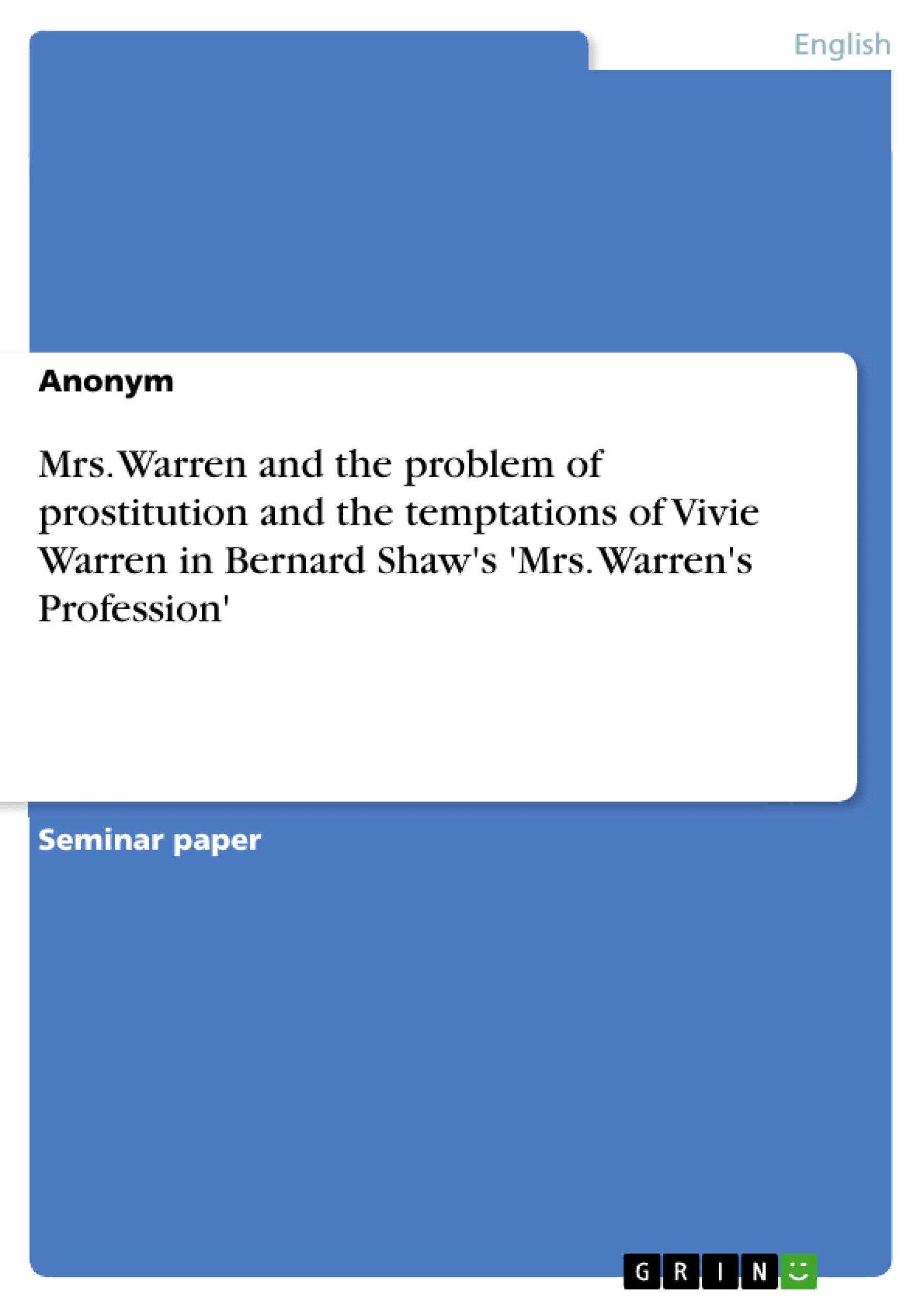Introduction
"Mrs Warren′s Profession was written in 1894 to draw the attention to the truth that prostitution is caused, not by female depravity and male licentiousness, but simply by underpaying, under-valuing and over-working women so shamefully that the poorest of them are forced to resort to prostitution to keep body and soul together."
(Shaw in his preface to Mrs Warren′s Profession; The Guthrie Theater Study Guide).
This paper analyzes how George Bernard Shaw explores the problem of prostitution and the temptations that Vivie Warren faces in his play "Mrs Warren′s Profession" written in 1894. Concerning the problem of prostitution, Shaw gives an account of a conflict between individual needs and the morality of Victorian society. Furthermore, Shaw exposes the downsides of the principles and morality of the upper classes at the turn of the century. It was a period of sexual repression, which lasted during the 1890s and into the 20th century. The author claims that the "White Slave Traffic", which referred to prostitutes as slaves, was a social problem in post-industrial revolution England.
First I will analyze the exploration of the problem of prostitution by looking at the characters and their opinion towards prostition. Then I will focus on the justifications and reasons for prostitution that Shaw provides. In the second half of this paper, I will analyze the temptations Vivie Warren has to face also by looking at the characters and the evolution she goes through. I will finish off with a conclusion in respect to both analyses and by viewing the play as a morality play.
Because of the focus on prostitution and Shaw′s critical view of society′s attitude towards it, the play was censored and wasn′t performed until 1902 in a private club. Public perfomance didn′t take place until 1926 (Norton Topics Online). The censorship shows how controversial the issue of prostitution and how revolutionary Shaw′s play was in the Victorian period.
1. The problem of prostitution
1.1 The characters and the issue of prostitution
[...]
Table of Contents
- Introduction
- The problem of prostitution
- The characters and the issue of prostitution
- Mrs. Warren
- Vivie Warren
- Circumstances and reasons for prostitution
- The characters and the issue of prostitution
- The temptations for Vivie Warren
- The characters and their offers
- Reverend Samuel Gardner - Religion and the Church
- Sir George Crofts - Money and Social Position
- Mr. Praed - Arts and Aesthetics
- Frank Gardner - Young Love
- Mrs. Warren - Luxury and Materialism
- Vivie's aim for reality
- The characters and their offers
- Conclusion
Objectives and Key Themes
This paper analyzes how George Bernard Shaw explores the problem of prostitution and the temptations that Vivie Warren faces in his play “Mrs Warren's Profession” written in 1894. Shaw's play critiques Victorian society's hypocritical attitudes towards prostitution, exposing the double standards and the economic forces that drive women into this profession. The play highlights the conflict between individual needs and the moral codes of the time, particularly for women.
- The economic and social factors that contribute to prostitution
- The hypocrisy and double standards of Victorian society towards women and sexuality
- The individual choices and struggles of women in a restrictive society
- The temptations and pressures faced by Vivie Warren in navigating her own identity and morality
- The role of capitalism and the upper classes in perpetuating social inequalities and exploitation
Chapter Summaries
- Introduction: This section introduces the play "Mrs. Warren's Profession" and its author, George Bernard Shaw. It outlines the central themes of the play, focusing on the problem of prostitution and the challenges faced by Vivie Warren.
- The problem of prostitution: This chapter examines the characters and their attitudes towards prostitution. It analyzes the economic and social conditions that contribute to the existence of prostitution in Victorian England. Shaw's critique of the Victorian society's hypocrisy and double standards regarding women and sexuality is also explored.
- The temptations for Vivie Warren: This chapter focuses on the various characters and their offers to Vivie, each representing different temptations and life paths. These include offers of wealth, status, religion, and romantic love. The chapter explores Vivie's struggles in navigating these temptations and her search for true independence and self-determination.
Keywords
The play "Mrs. Warren's Profession" explores the themes of prostitution, Victorian society, social hypocrisy, economic inequality, women's rights, individual choice, morality, and the complexities of family relationships. It examines the conflict between individual needs and societal pressures, particularly for women in a restrictive and patriarchal society.
- Quote paper
- Anonym (Author), 2004, Mrs. Warren and the problem of prostitution and the temptations of Vivie Warren in Bernard Shaw's 'Mrs. Warren's Profession', Munich, GRIN Verlag, https://www.grin.com/document/23393




